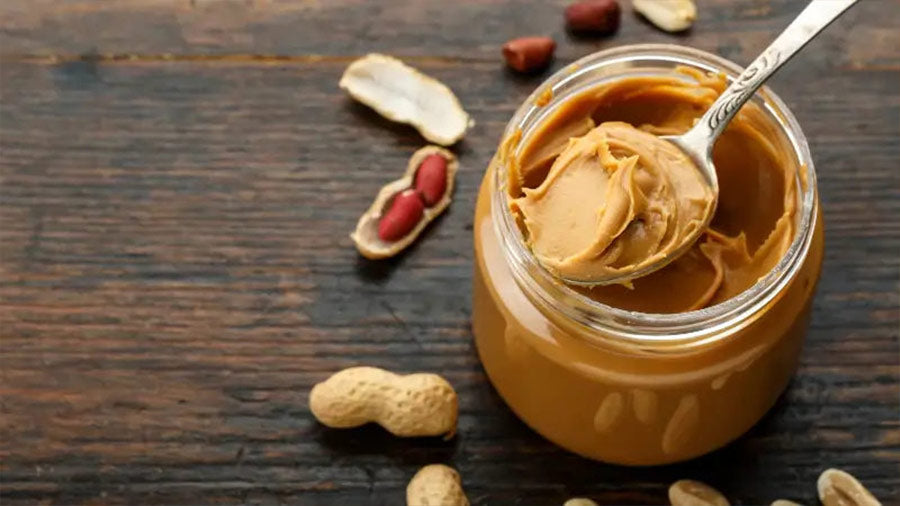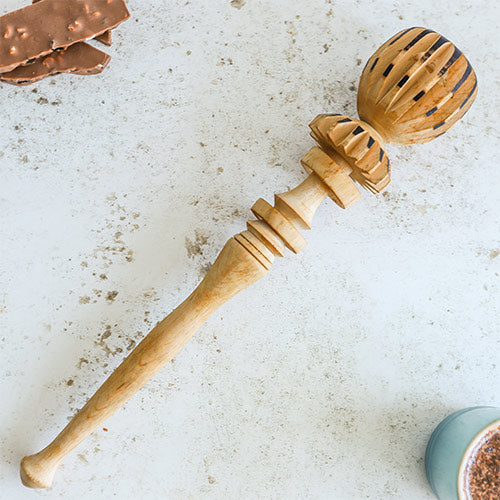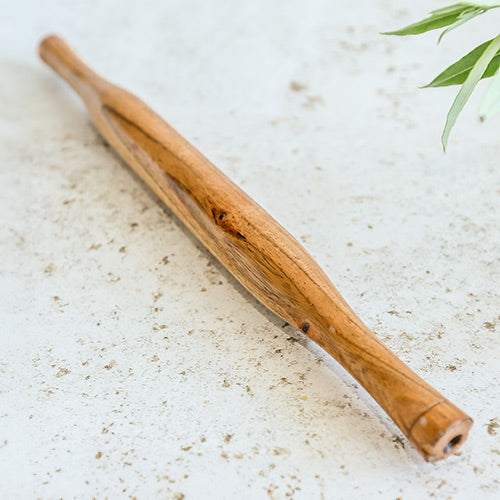This week we took on the challenge of making our own peanut butter, little did we know that we were doing it the healthiest way possible. Raw peanuts are higher in cell defending antioxidants and roasted salted peanuts are associated with high levels of sodium which health professionals have linked to heart disease.
Normally peanut butter you buy from the store can be quite salty, oily or even too sweet, when you make your own it’s a whole other story because you can adjust it to your own taste, prefer it sweet? add some honey, enjoy the natural flavour of peanuts? Leave it plain. When the peanuts and oil combine, you will have a unique nutty but delicious taste. Shop bought peanut butter is usually made from roasted peanuts, but we made ours without roasting them for a healthier twist.
The texture, taste and look was completely different from your usual roasted peanut butter. It had a more mellow flavour, the texture was slightly tougher, and it was more pale in colour. To spread on a rice cake was a challenge as the texture turned out more dough like, but we put that down to the no palm oil. We added honey and a pinch of salt and it really brought out the flavour.
The benefits of raw peanuts

- Raw peanuts provide you with beneficial fibre and protein, which makes them a great snack for when you’re working out at the gym.
- Magnesium and copper - raw peanuts add much health to your diet thanks to their magnesium and copper content, copper plays a role in your immune system and magnesium promotes health muscle function and helps your cells produce energy. Raw peanuts also have higher cell defending antioxidant properties.
- Versatile when adding into meals.
- Aids in weight loss. Despite their high fat and calorie content peanuts aid in weight loss due to their healthy fats and experts suggest that they may even reduce the risk of obesity.
The benefits of roasted peanuts
- Roasted peanuts can be enjoyed as part of a balanced diet and contain vitamins and minerals.
- The flavour is tastier due to the higher fat content, if salt is added, they become even more delicious.
- In direct comparison to raw peanuts they are less bitter, and the texture is improved.
In general roasted salted peanuts have a more intense nutty flavour and are more delicious, but they do contain more fat, which means they are probably not the best choice if you are trying to lose weight. Whilst either can be eaten as part of a balanced diet, we would recommend eating homemade raw peanut butter rather than the roasted variety. As we come to a conclusion it is clear that roasted peanuts are associated with a deep flavour, whereas raw peanuts are a healthier option.
The health benefits of unsalted peanuts

Peanuts can be consumed in many ways and are a popular snack amongst cultures around the globe. They can be eaten right out the shell, crushed to make peanut butter or even sprinkled over a salad for that extra flavour or crunch. A recent survey conducted by Mintel discovered that 64% of 2000 adults stated they had eaten peanuts in the past 3 months. This was significantly higher than the number of adults who reported that had eaten almonds, cashews, pistachios, or trail mix.
This creates the question, are peanuts actually an important part of a healthy diet? Recent research has stated that an ounce of dry roasted peanuts has 166 calories and 14 grams of fat, which has resulted in both everyday individuals and experts to put them in the category of a “not so healthy” food. However, new studies are now showing that peanuts may actually have been miscategorized.
Peanuts are technically legumes, but have been grouped into the category of nuts as they have a very similar nutritional profile. Much like other nuts, they’re extremely high in natural protein, which is essential for muscle recovery and functionality. On top of this, they also contain several extremely healthy nutrients. These include a number of antioxidants, iron, magnesium, and fibre.
We often consider something being “fatty” as bad for us, though this is not necessarily the case. The majority of fats that are found in peanuts are heart-healthy mono- and polyunsaturated fats. This means they actually help lower “bad” LDL cholesterol. A number of studies have found that individuals who eat peanuts, actually enjoy benefits for the heart, rather than damage caused by fat. As a result, it could be argued that when eaten as part of a balanced diet, unsalted peanuts are actually great for your body and can provide you with numerous health benefits.
Raw Peanut Butter Recipe
Peanut butter is super yummy and it always manages to find its way on our shopping list. Whether crunchy or smooth both variations are extremely versatile and can be used for different things. Peanuts alone have many nutrients and are a great source of healthy fats, protein, fiber, as well vitamins and minerals. Whilst they are high in calories they are low in carbohydrates, which makes them nutrient rich.
In many households, peanut butter is a staple food that can be spread for a snack when hunger strikes. It is eaten on toast, rice cakes, crackers , etc. But not just as a snack, it can also be added to meals and is beloved for its texture and flavour. To name a few Asian dishes that include peanut butter: chicken satay, and kung pao prawn.
If you love peanut butter as much as us, you should know that commercially produced peanut butter that you find in the store is not as nutritious as it could be, some brands add high amounts of salt, sugar, preservatives to there product and some use a dangerous unsustainable palm oil that is simply high in saturated fat which is directly linked to heart disease and bad cholesterol. Palm oil is also bad for the environment. Finally and most importantly, homemade food always tastes better, you will however need a good quality blender.
Ingredients
- Unsalted peanuts (500g)
- Vegetable oil (50ml)
- Salt (optional)
Method
- Add peanuts into a blender and blend on a minimum speed for 2 minutes.
- stop the blender and add the oil then continue to blend on a medium speed for 2 minutes.
Peanut Butter - Frequently Asked Questions
What’s the difference in taste between raw and roasted peanut butter?
Raw peanut butter tends to have a more mellow, less intense flavor compared to roasted peanut butter, which has a deeper, richer taste due to the roasting process. Roasting also helps improve the texture, making it smoother and less dough-like than raw peanut butter.
Is raw peanut butter healthier than roasted peanut butter?
Yes, raw peanut butter is considered healthier due to its higher levels of antioxidants and the absence of added salt or unhealthy fats. Roasted peanut butter, especially if salted, can be higher in sodium and fats, which may contribute to heart health issues if consumed in excess.
Can I make raw peanut butter at home?
Absolutely! Making raw peanut butter at home is simple and allows you to control the ingredients. You'll need unsalted raw peanuts, some oil (like vegetable or peanut oil), and a blender. The process involves blending the peanuts into a smooth, spreadable consistency. For extra flavour, you can add a pinch of salt or honey.
Does roasting peanuts reduce their nutritional value?
Roasting peanuts can cause some loss of certain heat-sensitive vitamins and antioxidants, but the overall nutritional profile (such as protein, healthy fats, and fiber) remains largely unchanged. Roasting can, however, improve the flavor and texture, making it more appealing for some people.
Are roasted peanuts still healthy despite their higher fat content?
Yes, roasted peanuts can still be part of a healthy diet. They provide essential nutrients like protein, fiber, magnesium, and healthy fats that promote heart health. However, if you're concerned about weight loss or managing cholesterol levels, it's best to consume roasted peanuts in moderation, especially if they’re salted or contain added oils.











3 comments
Nick
It’s not so much that roasted peanuts are higher in fat, more that they are lower in moisture. The roasting process removes moisture from the nuts, resulting in a peanut that is more concentrated, or dried. 100g roasted peanuts would start as, perhaps, 110g raw peanuts.
Ryan Bomzer
@Eva
Only roasted peanuts that have added oil will have a higher fat content, this typically refers to shop brought roasted peanuts or nut butter. Your roasted peanuts will be healthier 😊
Eva
Can you please explain why roasted peanuts have higher fat content? I roast my own peanuts in the oven, and I add no salt nor oils.